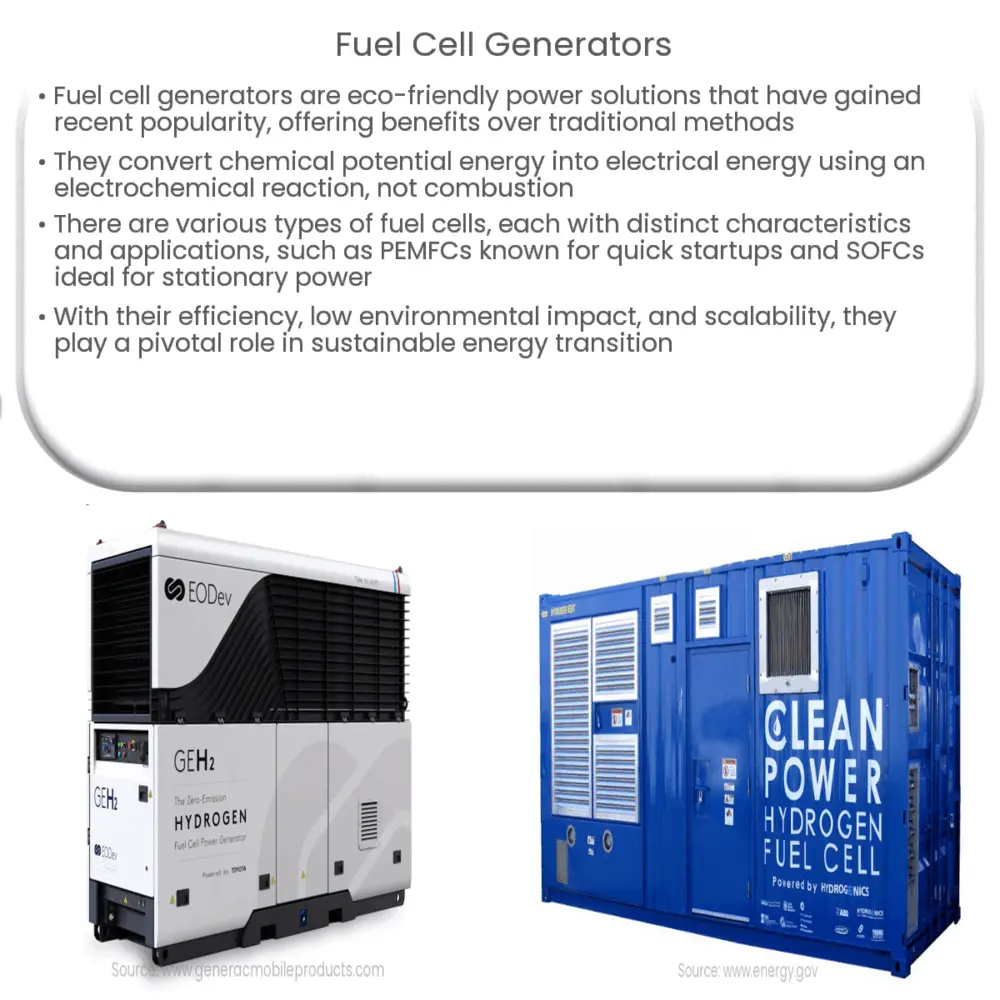Explore the workings, types, and applications of fuel cell generators, their environmental impact, and the future of this sustainable energy source.

Understanding Fuel Cell Generators
Fuel cell generators are a unique, eco-friendly power solution that have gained popularity in recent years. They offer substantial benefits over traditional power generation methods, warranting a closer look at their design, functionality, and applications.
What is a Fuel Cell Generator?
A fuel cell generator is a device that converts chemical potential energy (energy stored in molecular bonds) into electrical energy. This is accomplished using a unique type of electrochemical cell known as a fuel cell. Unlike conventional combustion-based technologies, fuel cells generate electricity through an electrochemical reaction, not combustion, resulting in cleaner, more efficient energy production.
How Does a Fuel Cell Generator Work?
The operation of a fuel cell generator can be explained in three steps:
- Hydrogen or another fuel is introduced to the anode (the positive post of the fuel cell).
- The catalyst at the anode separates hydrogen molecules into protons and electrons, creating a flow of electricity.
- The protons pass through a proton exchange membrane (PEM) to the cathode (the negative post), while the electrons create a separate current that can be utilized before they return to the cathode.
Types of Fuel Cells
There are several types of fuel cells, each with unique characteristics and applications. These include:
- Proton Exchange Membrane Fuel Cells (PEMFC): Known for their quick startup times and suitability for applications requiring rapid changes in power output.
- Solid Oxide Fuel Cells (SOFC): Noted for their high operating temperatures and efficiency, making them ideal for stationary power generation.
- Molten Carbonate Fuel Cells (MCFC): Renowned for their ability to capture and utilize waste heat, improving overall efficiency.
These represent only a small sample of the wide variety of fuel cell technologies available today. Each has its advantages and disadvantages, making them better suited to some applications than others.
Applications of Fuel Cell Generators
Fuel cell generators find use in a diverse range of applications, from powering space missions to supplying energy to homes and businesses. They have also seen increased adoption in the automotive industry, with a number of manufacturers developing fuel cell-powered vehicles. A unique feature of fuel cells is their scalability, making them suitable for small portable devices as well as large-scale power generation.
The Future of Fuel Cell Generators
Fuel cell technology continues to evolve rapidly, driven by the worldwide push towards sustainable energy sources. Ongoing research is focused on addressing current challenges, such as improving the efficiency and lifespan of fuel cells, reducing their cost, and finding more sustainable sources of hydrogen.
Fuel Cell Generators and Environmental Impact
One of the main benefits of fuel cell generators is their minimal environmental impact compared to traditional power generation methods. Because they generate electricity through electrochemical reactions instead of combustion, they produce fewer pollutants. When hydrogen is used as the fuel, the only byproduct is water, making fuel cell generators a virtually emission-free power source.
Fuel Cell Generators vs. Traditional Generators
Compared to traditional generators, fuel cell generators have several advantages. Firstly, they are quieter, as their operation does not involve any mechanical moving parts. Additionally, they are generally more efficient, especially at smaller scales, and have lower maintenance requirements. However, their initial cost and the infrastructure needed to supply the fuel, especially for hydrogen, can be higher.
Conclusion
In conclusion, fuel cell generators represent a significant technological advancement in the field of power generation. With their high efficiency, low environmental impact, and wide range of applications, they are poised to play a crucial role in the global transition towards sustainable energy. The ongoing developments in fuel cell technology, driven by research and innovation, promise to overcome existing challenges and accelerate their widespread adoption.
While there are still obstacles to be overcome, particularly regarding the infrastructure for hydrogen fuel and initial costs, the potential benefits of fuel cell generators make them a compelling area for further exploration and investment. As we move towards a more sustainable future, the role of fuel cell technology will undoubtedly continue to grow.

